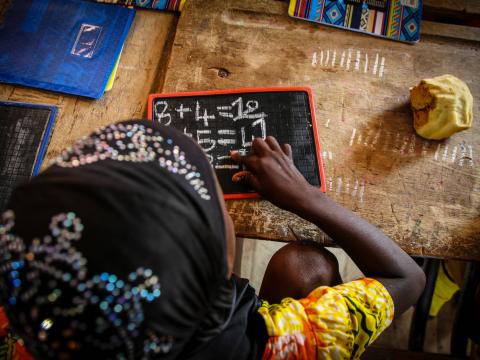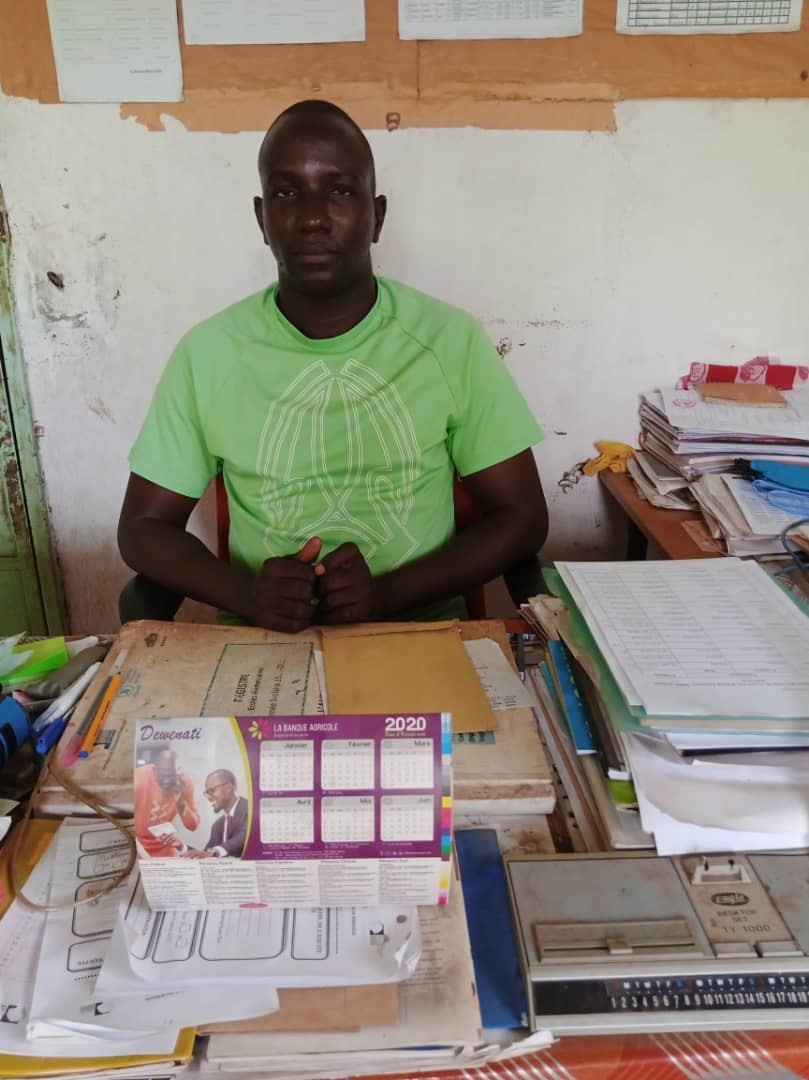Adapted reading clubs: Bringing books closer to children

“COVID-19 closed our school. But thanks to World Vision community volunteers who visited me regularly at home with books, this enabled me to continue reading and revising. I am now no longer afraid of facing the CFEE exam and entry into sixth grade. I feel confident and will succeed,” a confident Aminata asserts.
Improving the quality of teaching for children is one of the most critical strategic objectives of the Education sector at World Vision. Working closely to ensure proper inspection of learning academies, World Vision works towards improving reading and life skills for children in the elementary cycle. The best-suited project model is that of “Unlock Literacy.”
This project model is composed of four components: reading assessment; teacher training; community involvement; and the creation of additional reading resources from local materials.
The community engagement component focuses on the empowerment and commitment of communities, to deploy traditional mechanisms of solidarity, mutual aid, and volunteering to help improve children's reading skills. The implementation of this component enabled the setting up of book clubs within the community that was run and supervised through the voluntary system.
At World Vision's Kedougou Cluster intervention zone, 55 reading clubs have been set up and equipped with reading books for children of all ages.
School principals, teachers, and parents are unanimous on the positive effects of these book clubs in enhancing academic skills and improving the general learning culture of children. The latest assessment of children's reading level carried out in 2019, showed that 6,348 children from grade one to three (CI to CE1) significantly improved their reading level. In 2018, it was placed at 35%.
The first case of COVID-19 was recorded in Senegal on 2nd March 2020. To limit the spread of the virus, protection and adaptation measures were taken by the Government. Some of them were likely to restrict gatherings and inter-urban travel, with the establishment of a state of emergency leading to the closure of schools. This put an end to intra-mural teachings and the activities of book clubs. It forced children to stay at home.
As part of its response to the COVID-19 pandemic in order to protect children, their families, and communities, 110 community volunteers were trained by World Vision and oriented on new approaches to implementing activities beneficial to children. This helped to maintain communication between families of the children and World Vision community volunteers.
It has been noted that the activities of book clubs are reducing the negative effects of COVID-19. They have allowed children to maintain a conducive educational environment within their home and enabling them to maintain a reading culture. This has given rise to the concept of the home book club. This led to the slogan: “The book towards the child and not the child towards the book”.
This approach that has been embraced by communities, was supported by animators, book club supervisors, as well as the parents. It has allowed children to develop their reading capacities and their life skills.
“2020 has been particularly worrying for the future of our students. The advent of COVID-19 with the closing of schools was a major problem. Our efforts to improve the quality of learning lessons especially in reading and mathematics has seriously been threatened. However, World Vision's initiative to support children at home with a system of lending books and raising awareness among parents was a very useful solution. It made it possible to keep children in an environment similar to school. In this sense, it is with great hope that I noticed during a home visit, that the volunteers regularly come to the homes and give books to the students. In addition, they make parents aware of the importance of monitoring children at home,” – Mr. Cissokho, Director of the Bandafassi School and reading clubs supervisor.

“The closure of schools was a very worrying situation for us parents. We had a lot of concerns about this year’s school program. Watching children play all day long without going to school was hard to bear. In our villages, there is no television. Our children only have schools to learn from. Closing schools deprived them of this privilege. We were very worried. This is why the initiative to make books available to children at their homes is beneficial. We appreciate this and are grateful to World Vision. The book club leaders did their job well. Thanks to them, we sometimes had the impression that our children were still in school. Home learning has been very beneficial in maintaining children’s educational level. We too have been able to understand the importance of supervising children at home. We really thank the book club leaders as well as World Vision, which has never ceased from offering solutions to our children's problems,” – Fatoumata, a parent to one pupil.
How do reading clubs at home work?
The home reading club operate in the form of home visits. Two facilitators identify the children who are members of the club within their village. They select the reading books from their traveling libraries, according to the grade level of the children to be visited. They then go down to the homes of the selected children and provide them with the appropriate reading books. They also give guidance to parents on the use and maintenance of the books.
This operation is repeated every two weeks, to recover and replace the first set. The books are collected and changed after this duration, to enable the children receive new sets.
When textbooks are placed with a family, they are available to all the children in that family. They can use them at will, but under the supervision of parents. This is to maintain good physical care of the textbooks. Since April of this year 7,388 reading books have been made available to 7,431 children.

“My name is Aminata. I am a student in CM2 class. The coronavirus disease led to closure of our school. We were forced to stay at home, without knowing when learning would resume. I was afraid because this year I am in an exam class and we did not know how long this would last. But when I heard of World Vision's initiative to share the reading books with us at home, I was excited and really looked forward being part of it. One day the facilitator of the reading club in our village came over to identify us and promised to come back with the reading books. I was really very happy. Since then, this community volunteer visits us once every two weeks to bring new books to replace the old ones. These books help me read and revise. I feel like school is ongoing for me within my home. I no longer worry about taking the CFEE exam and entering sixth grade. I feel confident and I believe that I will succeed”.
World Vision plans to continue this system until the normal resumption of school activities. Unfortunately during this rainy season that runs from June to October, transportation of people and goods has been greatly affected due to flooding in certain areas. Children will not be able to keep the reading books they will receive during this rainy season. All sessions to assess children's reading progress and comprehension will be organised in collaboration with the facilitators and supervisors of the reading clubs and the school directors.
---
By Crépin Louhoungou, Program Manager, Kedougou Cluster, World Vision Senegal